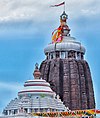Jagannatha Dasa (Odia poet)
This article includes a list of general references, but it lacks sufficient corresponding inline citations. (April 2014) |
Atibadi Jagannatha Dasa | |
|---|---|
 Ancient idol of Jagannatha Dasa in Puri's Bada Odia Matha, which Jagannatha himself established | |
| Native name | ଅତିବଡ଼ି ଜଗନ୍ନାଥ ଦାସ |
| Born | 19 October 1490 Kapileswarpur, Puri, India |
| Occupation | Poet, seer |
| Language | Odia |
| Nationality | Indian |
| Notable works | Odia Bhagavata Purana |
Jagannatha Dasa (c. 1490–1550), known by the honorific Atibadi, meaning "very great" (Odia: ଅତିବଡ଼ି ଜଗନ୍ନାଥ ଦାସ, romanized: Atibaḍi Jagannātha Dāsa, Odia: [ɔt̪ibɔɽi d͡ʒɔɡɔnnaːt̪ʰɔ d̪aːsɔ] ⓘ), was an Odia poet and litterateur. He was one of the five great poets (along with Ananta Dasa, Jasobanta Dasa, Balarama Dasa and Achyutananda Dasa) in Odia literature, known as the Panchasakha ("five friends"). He wrote the Odia Bhagavata Purana (Bhagabata).[1][2][3][4][5]
Early life[edit]
Dasa was born in Kapileswarpur Sasana (one of the 16 traditional Sasana villages in Puri[clarification needed]) on Radhastami in 1490, in an established Brahmin family of the Kaushiki gotra. His mother was Padmabati Debi and his father was Bhagabana Dasa.
His father was a speaker of the Bhagabata in Utkala. Pleased with Bhagabana Dasa's elucidation of the Purana, Purushottama Deva, the then reigning king of Utkala,[citation needed] gave him the title "Purana Panda". He trained Jagannatha to follow him as a Purana Panda. Jagannatha Dasa was almost the same age as Chaitanya Mahaprabhu. Soon after their chance meeting under the Kalpa Bata tree, a spiritual kinship grew between the two that developed into a warm, lifelong friendship.[citation needed] Chaitanya was an avid admirer of Dasa and called him "Atibadi."[citation needed]
Literary works[edit]
Dasa wrote the Odia Bhagabata. It had a great influence in the standardizing of the Odia language. Its popularity in Odisha reached to the level of it being worshiped in many homes. The villages in Odisha used to have a small house or room known as the bhagabata tungi, where villagers would gather to listen to recitations of Dasa's Bhagabata. Many of its verses have become proverbs and are cited by people throughout Odisha.
The work includes 12 volumes and each volume has 10–30 chapters. Each chapter has 50 to 300 stanzas.
The Odia Bhagabata has been translated into English. The English translation is Readings from Bhagabata.[6]
References[edit]
- ^ The Contemporary Relevance of Sri Jagannath Dasa's Srimad Bhagavata in Oriya
- ^ "ATIBADI JAGANNATHA DAS, POET THE GREAT". Orissa Diary. Archived from the original on 2014-06-28. Retrieved 2014-04-25.
- ^ "ATIBADI JAGANNATHA DAS". Archived from the original on 2013-06-30. Retrieved 2014-04-25.
- ^ "Atibadi Jagannath Das". Nirmalya. 17 February 2023.
- ^ "ATIBADI JAGANNATH DASA ~ ଆମଓଡିଶାର.com". amoodishara.com.
- ^ Das, G. N. (1 January 1996). Readings from Bhagabata. Abhinav Publications. ISBN 978-81-7017-337-3.


